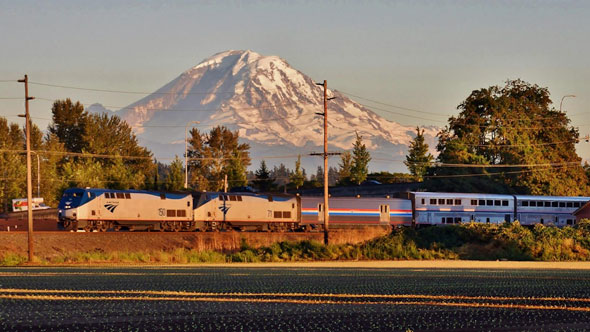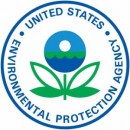
The FRA released its final rule on railroad safety plans, mandating formal and auditable such programs for the nation’s passenger infrastructure. These will impact freight carriers as well, since the majority of lines host both types of operations. Here Amtrak’s Coast Starlight rolls under Mount Rainier in Washington State on a warm summer evening. Image © 8/2016 by Nikki Burgess; all rights reserved.
To a certain degree, the “dog days” of summer do seem to be here; action in the regulatory sector last week was limited, the exception being two major rules implemented to impact the nation’s rail infrastructure, affecting both safety of operation and the carriage of flammable liquids. Here’s the week’s breakdown:
FRA
FRA announces the fifty-sixth meeting of the RSAC, a Federal Advisory Committee that develops railroad safety regulations through a consensus process. The Remote Control Locomotive, Track Standards, Hazardous Materials Issues, and Rail Integrity Working Groups, and Engineering Task Force will provide status reports. The RSAC meeting is scheduled to commence at 9:30 a.m. on Thursday, September 15, 2016, and will adjourn by 4:30 p.m. Want to attend? Here’s your link:
https://www.gpo.gov/fdsys/pkg/FR-2016-08-10/pdf/2016-19010.pdf
In big safety news on the rails, the FRA is issuing a final rule to mandate that commuter and intercity passenger railroads develop and implement a system safety program (SSP) to improve the safety of their operations. A SSP is a structured program with proactive processes and procedures, developed and implemented to identify and mitigate or eliminate hazards and the resulting risks on each railroad’s system. An SSP will be implemented after receiving approval by FRA of a submitted SSP plan. FRA will audit a railroad’s compliance with its SSP. This final rule is effective October 11, 2016.
https://www.gpo.gov/fdsys/pkg/FR-2016-08-12/pdf/2016-18301.pdf
Last but assuredly not least in the “railroad world,” see the PHMSA listing immediately below on the rule affecting tank cars!
PHMSA
As noted above, PHMSA (which agency controls certain aspects of rail tank car construction as “packaging,” vice the operational matters that the FRA itself controls) issued a final rule to codify in the Hazardous Materials Regulations certain mandates and minimum requirements of the FAST Act. Specifically, the FAST Act mandates a revised phase-out schedule for all DOT Specification 111 tank cars used to transport unrefined petroleum products (e.g., petroleum crude oil), ethanol, and other Class 3 flammable liquids. The FAST Act also requires that each tank car built to meet the DOT Specification 117 and each non-jacketed tank car retrofitted to meet the DOT Specification 117R be equipped with a thermal protection blanket that is at least 1⁄2-inch thick and meets existing thermal protection standards. Further, the FAST Act mandates minimum top fittings protection requirements for tank cars retrofitted to meet the DOT Specification 117R. The new rule is effective immediately. Note that “phase out” dates stretch several years into the future, depending on what service the tank car(s) in question is/are in. All continued fall out over the August 2013 oil train disaster in Lac Megantic, Quebec in which forty seven residents lost their lives. See the story here:
https://www.gpo.gov/fdsys/pkg/FR-2016-08-15/pdf/2016-19406.pdf
PHMSA continues its usual process of working through Special Permits. This week’s action includes applications. Here’s your way in:
https://www.gpo.gov/fdsys/pkg/FR-2016-08-10/pdf/2016-18198.pdf
https://www.gpo.gov/fdsys/pkg/FR-2016-08-10/pdf/2016-18199.pdf
https://www.gpo.gov/fdsys/pkg/FR-2016-08-10/pdf/2016-18200.pdf
EPA
In a formal (legally binding) regulatory finding almost certain to create controversy and provoke litigation, the EPA found that normal aircraft engine emissions contribute to climate change. This opens the entire aircraft engine manufacturing sector to the same kind of often expensive and complicated emissions control regimen that currently impacts most ground based internal combustion engine systems. That is of course if the finding survives an almost certain legal challenge from the aviation industry. Time will tell. Meanwhile, here’s the finding:
https://www.gpo.gov/fdsys/pkg/FR-2016-08-15/pdf/2016-18399.pdf
Labelmaster is a full service provider of products and services for the Hazardous Materials and Dangerous Goods professional, shippers, transport operators, and EH&S providers. See our full line of solutions at www.labelmaster.com.


